ECTPP302A Essay: Subjectivity's Role in Child Pedagogy
VerifiedAdded on 2023/06/07
|8
|2348
|315
Essay
AI Summary
This essay delves into the concept of pedagogy, defining it as the teaching practices and strategies used to engage children and promote their learning. It examines the importance of subjectivity in understanding children's learning and development, contrasting it with objective scientific observation. The essay explores the philosophical underpinnings of subjectivity, referencing the Reggio Emilia approach and the Early Years Learning Framework (EYLF). It analyzes the significance of considering children as active agents in their own learning and the role of child psychology in developing effective pedagogical approaches. The discussion covers the interplay between subjectivity and objectivity, the value of diverse perspectives, and the use of technology in capturing children's experiences. Ultimately, the essay argues that objective scientific observation is not a myth, emphasizing the importance of a child-centered approach in curriculum planning and development to achieve quality developmental outcomes.
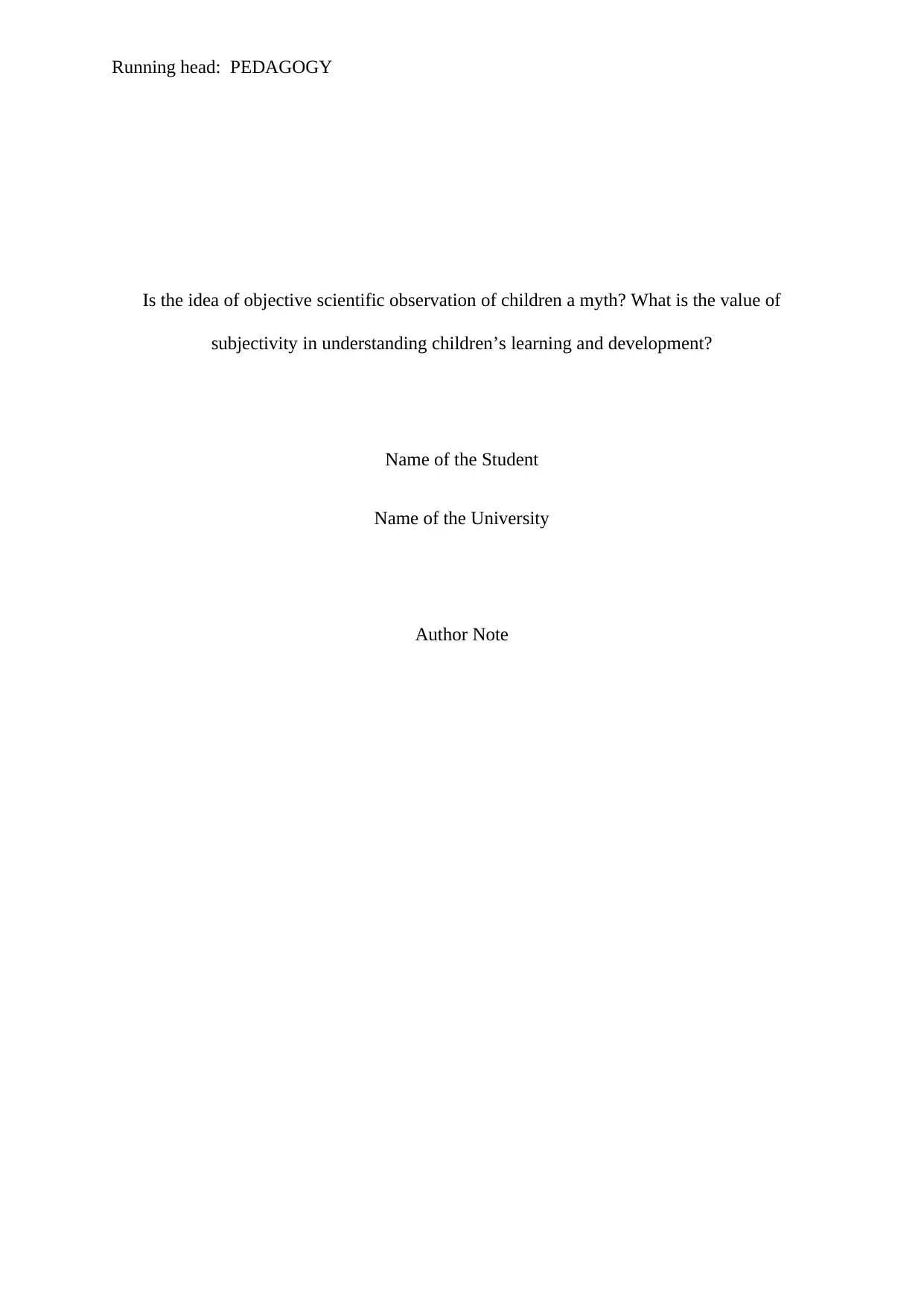
Running head: PEDAGOGY
Is the idea of objective scientific observation of children a myth? What is the value of
subjectivity in understanding children’s learning and development?
Name of the Student
Name of the University
Author Note
Is the idea of objective scientific observation of children a myth? What is the value of
subjectivity in understanding children’s learning and development?
Name of the Student
Name of the University
Author Note
Paraphrase This Document
Need a fresh take? Get an instant paraphrase of this document with our AI Paraphraser
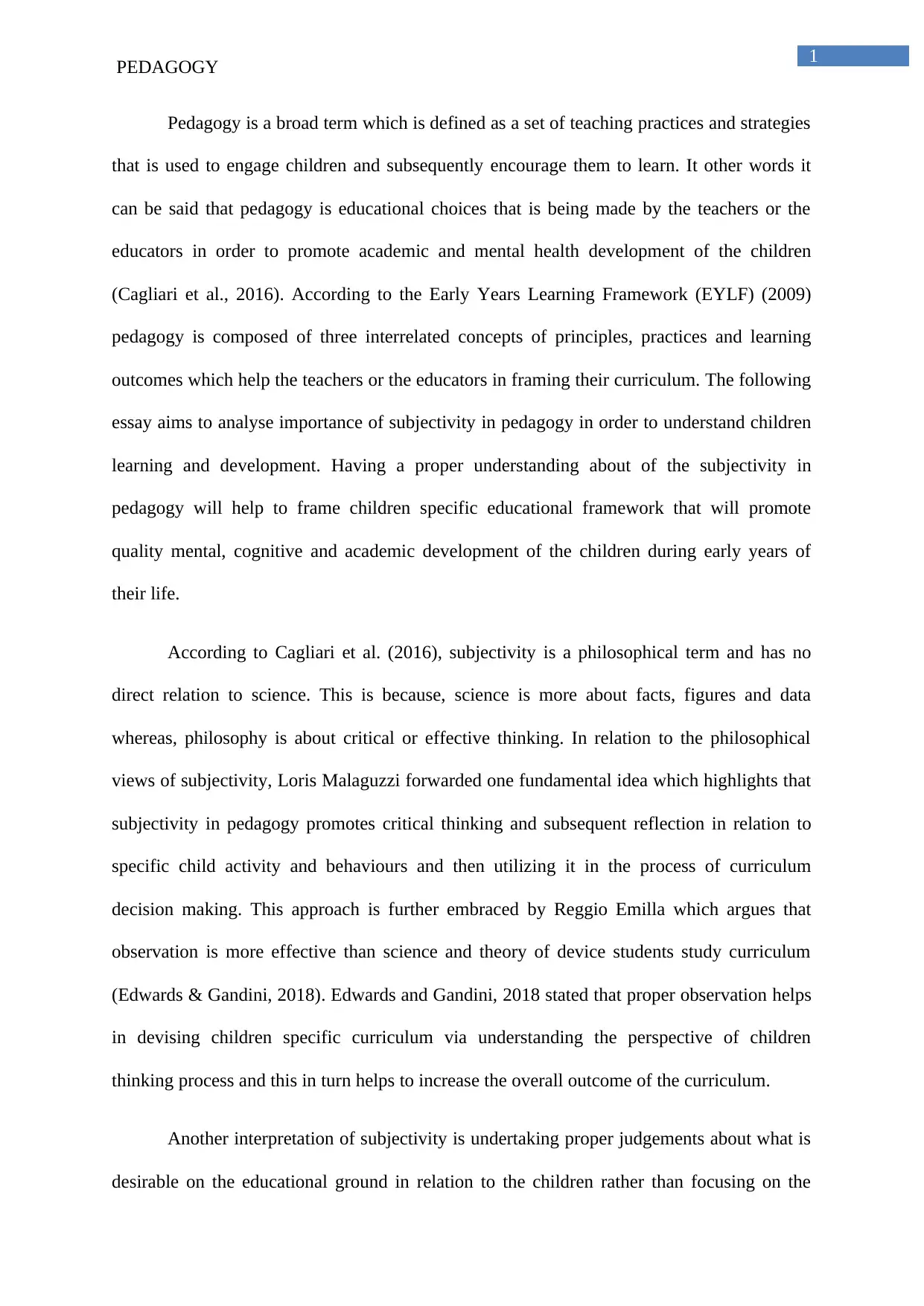
1
PEDAGOGY
Pedagogy is a broad term which is defined as a set of teaching practices and strategies
that is used to engage children and subsequently encourage them to learn. It other words it
can be said that pedagogy is educational choices that is being made by the teachers or the
educators in order to promote academic and mental health development of the children
(Cagliari et al., 2016). According to the Early Years Learning Framework (EYLF) (2009)
pedagogy is composed of three interrelated concepts of principles, practices and learning
outcomes which help the teachers or the educators in framing their curriculum. The following
essay aims to analyse importance of subjectivity in pedagogy in order to understand children
learning and development. Having a proper understanding about of the subjectivity in
pedagogy will help to frame children specific educational framework that will promote
quality mental, cognitive and academic development of the children during early years of
their life.
According to Cagliari et al. (2016), subjectivity is a philosophical term and has no
direct relation to science. This is because, science is more about facts, figures and data
whereas, philosophy is about critical or effective thinking. In relation to the philosophical
views of subjectivity, Loris Malaguzzi forwarded one fundamental idea which highlights that
subjectivity in pedagogy promotes critical thinking and subsequent reflection in relation to
specific child activity and behaviours and then utilizing it in the process of curriculum
decision making. This approach is further embraced by Reggio Emilla which argues that
observation is more effective than science and theory of device students study curriculum
(Edwards & Gandini, 2018). Edwards and Gandini, 2018 stated that proper observation helps
in devising children specific curriculum via understanding the perspective of children
thinking process and this in turn helps to increase the overall outcome of the curriculum.
Another interpretation of subjectivity is undertaking proper judgements about what is
desirable on the educational ground in relation to the children rather than focusing on the
PEDAGOGY
Pedagogy is a broad term which is defined as a set of teaching practices and strategies
that is used to engage children and subsequently encourage them to learn. It other words it
can be said that pedagogy is educational choices that is being made by the teachers or the
educators in order to promote academic and mental health development of the children
(Cagliari et al., 2016). According to the Early Years Learning Framework (EYLF) (2009)
pedagogy is composed of three interrelated concepts of principles, practices and learning
outcomes which help the teachers or the educators in framing their curriculum. The following
essay aims to analyse importance of subjectivity in pedagogy in order to understand children
learning and development. Having a proper understanding about of the subjectivity in
pedagogy will help to frame children specific educational framework that will promote
quality mental, cognitive and academic development of the children during early years of
their life.
According to Cagliari et al. (2016), subjectivity is a philosophical term and has no
direct relation to science. This is because, science is more about facts, figures and data
whereas, philosophy is about critical or effective thinking. In relation to the philosophical
views of subjectivity, Loris Malaguzzi forwarded one fundamental idea which highlights that
subjectivity in pedagogy promotes critical thinking and subsequent reflection in relation to
specific child activity and behaviours and then utilizing it in the process of curriculum
decision making. This approach is further embraced by Reggio Emilla which argues that
observation is more effective than science and theory of device students study curriculum
(Edwards & Gandini, 2018). Edwards and Gandini, 2018 stated that proper observation helps
in devising children specific curriculum via understanding the perspective of children
thinking process and this in turn helps to increase the overall outcome of the curriculum.
Another interpretation of subjectivity is undertaking proper judgements about what is
desirable on the educational ground in relation to the children rather than focusing on the
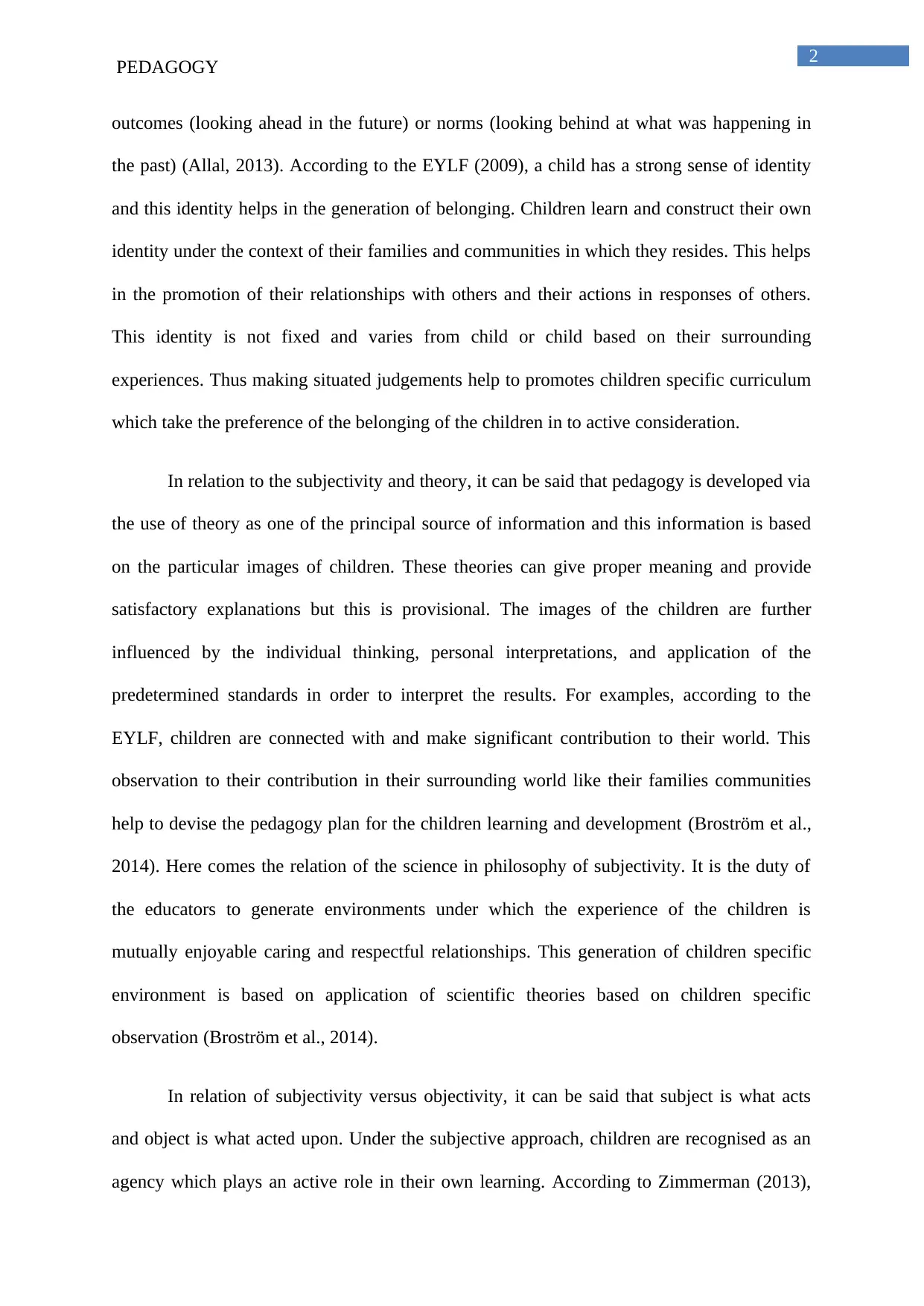
2
PEDAGOGY
outcomes (looking ahead in the future) or norms (looking behind at what was happening in
the past) (Allal, 2013). According to the EYLF (2009), a child has a strong sense of identity
and this identity helps in the generation of belonging. Children learn and construct their own
identity under the context of their families and communities in which they resides. This helps
in the promotion of their relationships with others and their actions in responses of others.
This identity is not fixed and varies from child or child based on their surrounding
experiences. Thus making situated judgements help to promotes children specific curriculum
which take the preference of the belonging of the children in to active consideration.
In relation to the subjectivity and theory, it can be said that pedagogy is developed via
the use of theory as one of the principal source of information and this information is based
on the particular images of children. These theories can give proper meaning and provide
satisfactory explanations but this is provisional. The images of the children are further
influenced by the individual thinking, personal interpretations, and application of the
predetermined standards in order to interpret the results. For examples, according to the
EYLF, children are connected with and make significant contribution to their world. This
observation to their contribution in their surrounding world like their families communities
help to devise the pedagogy plan for the children learning and development (Broström et al.,
2014). Here comes the relation of the science in philosophy of subjectivity. It is the duty of
the educators to generate environments under which the experience of the children is
mutually enjoyable caring and respectful relationships. This generation of children specific
environment is based on application of scientific theories based on children specific
observation (Broström et al., 2014).
In relation of subjectivity versus objectivity, it can be said that subject is what acts
and object is what acted upon. Under the subjective approach, children are recognised as an
agency which plays an active role in their own learning. According to Zimmerman (2013),
PEDAGOGY
outcomes (looking ahead in the future) or norms (looking behind at what was happening in
the past) (Allal, 2013). According to the EYLF (2009), a child has a strong sense of identity
and this identity helps in the generation of belonging. Children learn and construct their own
identity under the context of their families and communities in which they resides. This helps
in the promotion of their relationships with others and their actions in responses of others.
This identity is not fixed and varies from child or child based on their surrounding
experiences. Thus making situated judgements help to promotes children specific curriculum
which take the preference of the belonging of the children in to active consideration.
In relation to the subjectivity and theory, it can be said that pedagogy is developed via
the use of theory as one of the principal source of information and this information is based
on the particular images of children. These theories can give proper meaning and provide
satisfactory explanations but this is provisional. The images of the children are further
influenced by the individual thinking, personal interpretations, and application of the
predetermined standards in order to interpret the results. For examples, according to the
EYLF, children are connected with and make significant contribution to their world. This
observation to their contribution in their surrounding world like their families communities
help to devise the pedagogy plan for the children learning and development (Broström et al.,
2014). Here comes the relation of the science in philosophy of subjectivity. It is the duty of
the educators to generate environments under which the experience of the children is
mutually enjoyable caring and respectful relationships. This generation of children specific
environment is based on application of scientific theories based on children specific
observation (Broström et al., 2014).
In relation of subjectivity versus objectivity, it can be said that subject is what acts
and object is what acted upon. Under the subjective approach, children are recognised as an
agency which plays an active role in their own learning. According to Zimmerman (2013),
⊘ This is a preview!⊘
Do you want full access?
Subscribe today to unlock all pages.

Trusted by 1+ million students worldwide
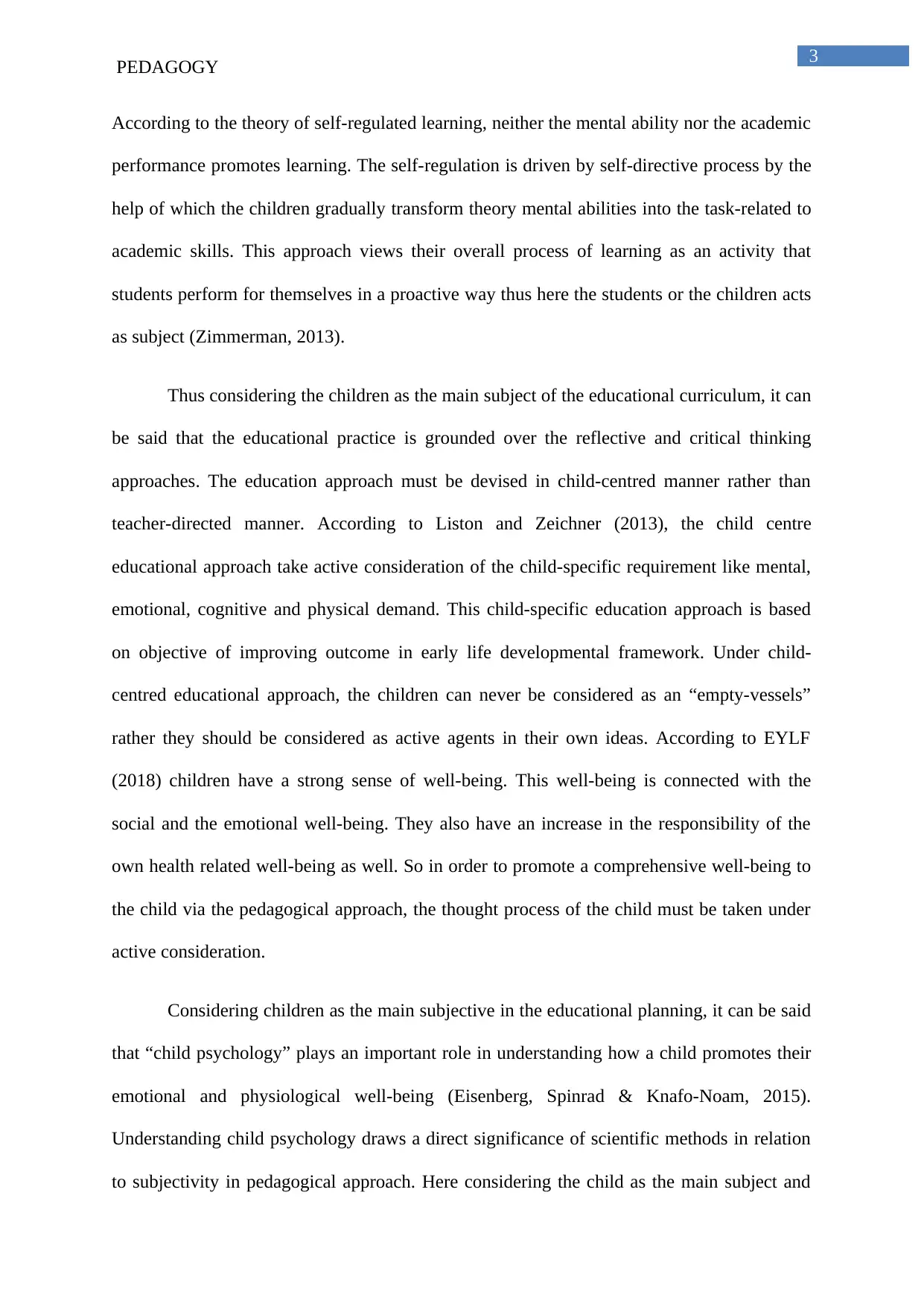
3
PEDAGOGY
According to the theory of self-regulated learning, neither the mental ability nor the academic
performance promotes learning. The self-regulation is driven by self-directive process by the
help of which the children gradually transform theory mental abilities into the task-related to
academic skills. This approach views their overall process of learning as an activity that
students perform for themselves in a proactive way thus here the students or the children acts
as subject (Zimmerman, 2013).
Thus considering the children as the main subject of the educational curriculum, it can
be said that the educational practice is grounded over the reflective and critical thinking
approaches. The education approach must be devised in child-centred manner rather than
teacher-directed manner. According to Liston and Zeichner (2013), the child centre
educational approach take active consideration of the child-specific requirement like mental,
emotional, cognitive and physical demand. This child-specific education approach is based
on objective of improving outcome in early life developmental framework. Under child-
centred educational approach, the children can never be considered as an “empty-vessels”
rather they should be considered as active agents in their own ideas. According to EYLF
(2018) children have a strong sense of well-being. This well-being is connected with the
social and the emotional well-being. They also have an increase in the responsibility of the
own health related well-being as well. So in order to promote a comprehensive well-being to
the child via the pedagogical approach, the thought process of the child must be taken under
active consideration.
Considering children as the main subjective in the educational planning, it can be said
that “child psychology” plays an important role in understanding how a child promotes their
emotional and physiological well-being (Eisenberg, Spinrad & Knafo‐Noam, 2015).
Understanding child psychology draws a direct significance of scientific methods in relation
to subjectivity in pedagogical approach. Here considering the child as the main subject and
PEDAGOGY
According to the theory of self-regulated learning, neither the mental ability nor the academic
performance promotes learning. The self-regulation is driven by self-directive process by the
help of which the children gradually transform theory mental abilities into the task-related to
academic skills. This approach views their overall process of learning as an activity that
students perform for themselves in a proactive way thus here the students or the children acts
as subject (Zimmerman, 2013).
Thus considering the children as the main subject of the educational curriculum, it can
be said that the educational practice is grounded over the reflective and critical thinking
approaches. The education approach must be devised in child-centred manner rather than
teacher-directed manner. According to Liston and Zeichner (2013), the child centre
educational approach take active consideration of the child-specific requirement like mental,
emotional, cognitive and physical demand. This child-specific education approach is based
on objective of improving outcome in early life developmental framework. Under child-
centred educational approach, the children can never be considered as an “empty-vessels”
rather they should be considered as active agents in their own ideas. According to EYLF
(2018) children have a strong sense of well-being. This well-being is connected with the
social and the emotional well-being. They also have an increase in the responsibility of the
own health related well-being as well. So in order to promote a comprehensive well-being to
the child via the pedagogical approach, the thought process of the child must be taken under
active consideration.
Considering children as the main subjective in the educational planning, it can be said
that “child psychology” plays an important role in understanding how a child promotes their
emotional and physiological well-being (Eisenberg, Spinrad & Knafo‐Noam, 2015).
Understanding child psychology draws a direct significance of scientific methods in relation
to subjectivity in pedagogical approach. Here considering the child as the main subject and
Paraphrase This Document
Need a fresh take? Get an instant paraphrase of this document with our AI Paraphraser
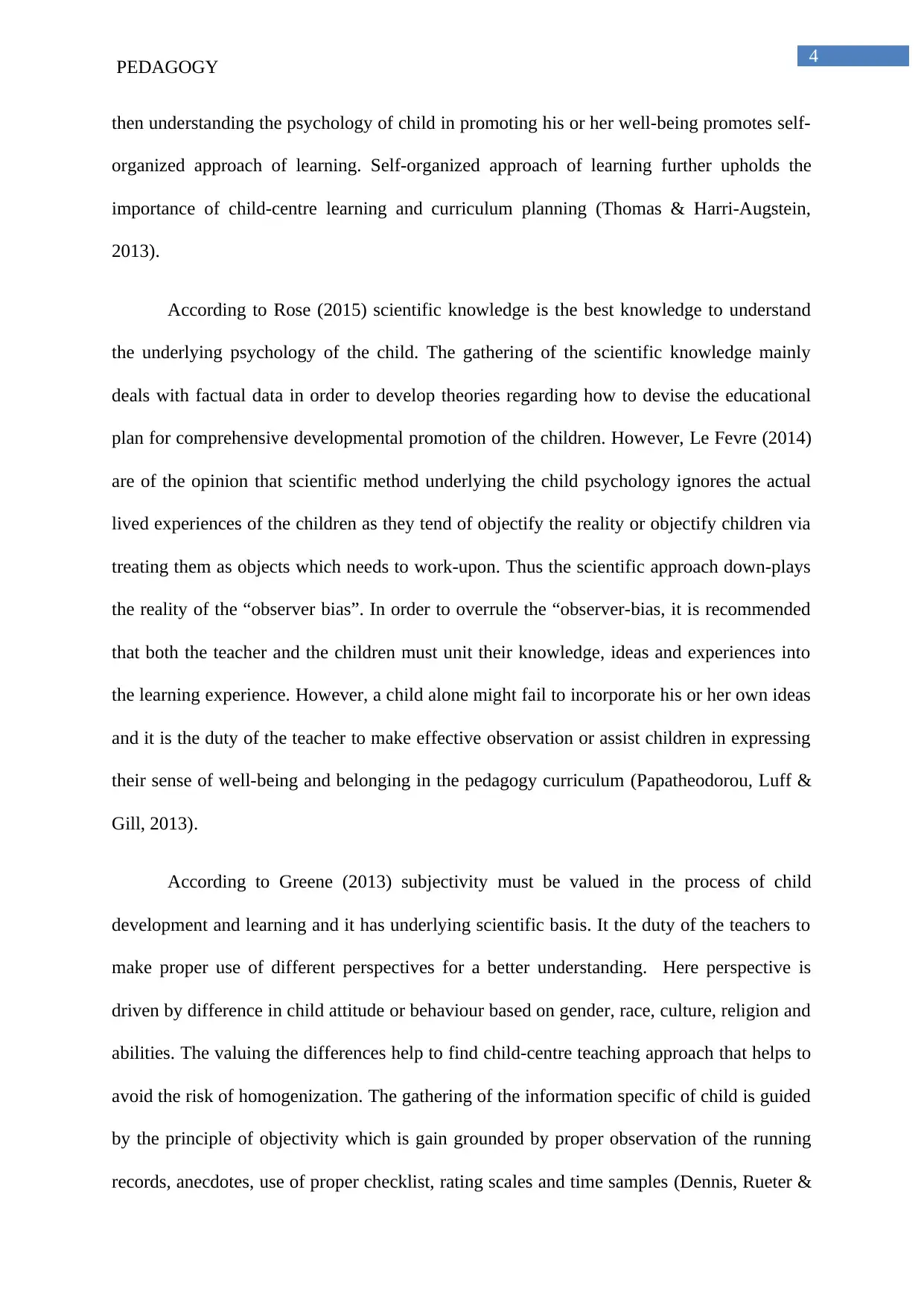
4
PEDAGOGY
then understanding the psychology of child in promoting his or her well-being promotes self-
organized approach of learning. Self-organized approach of learning further upholds the
importance of child-centre learning and curriculum planning (Thomas & Harri-Augstein,
2013).
According to Rose (2015) scientific knowledge is the best knowledge to understand
the underlying psychology of the child. The gathering of the scientific knowledge mainly
deals with factual data in order to develop theories regarding how to devise the educational
plan for comprehensive developmental promotion of the children. However, Le Fevre (2014)
are of the opinion that scientific method underlying the child psychology ignores the actual
lived experiences of the children as they tend of objectify the reality or objectify children via
treating them as objects which needs to work-upon. Thus the scientific approach down-plays
the reality of the “observer bias”. In order to overrule the “observer-bias, it is recommended
that both the teacher and the children must unit their knowledge, ideas and experiences into
the learning experience. However, a child alone might fail to incorporate his or her own ideas
and it is the duty of the teacher to make effective observation or assist children in expressing
their sense of well-being and belonging in the pedagogy curriculum (Papatheodorou, Luff &
Gill, 2013).
According to Greene (2013) subjectivity must be valued in the process of child
development and learning and it has underlying scientific basis. It the duty of the teachers to
make proper use of different perspectives for a better understanding. Here perspective is
driven by difference in child attitude or behaviour based on gender, race, culture, religion and
abilities. The valuing the differences help to find child-centre teaching approach that helps to
avoid the risk of homogenization. The gathering of the information specific of child is guided
by the principle of objectivity which is gain grounded by proper observation of the running
records, anecdotes, use of proper checklist, rating scales and time samples (Dennis, Rueter &
PEDAGOGY
then understanding the psychology of child in promoting his or her well-being promotes self-
organized approach of learning. Self-organized approach of learning further upholds the
importance of child-centre learning and curriculum planning (Thomas & Harri-Augstein,
2013).
According to Rose (2015) scientific knowledge is the best knowledge to understand
the underlying psychology of the child. The gathering of the scientific knowledge mainly
deals with factual data in order to develop theories regarding how to devise the educational
plan for comprehensive developmental promotion of the children. However, Le Fevre (2014)
are of the opinion that scientific method underlying the child psychology ignores the actual
lived experiences of the children as they tend of objectify the reality or objectify children via
treating them as objects which needs to work-upon. Thus the scientific approach down-plays
the reality of the “observer bias”. In order to overrule the “observer-bias, it is recommended
that both the teacher and the children must unit their knowledge, ideas and experiences into
the learning experience. However, a child alone might fail to incorporate his or her own ideas
and it is the duty of the teacher to make effective observation or assist children in expressing
their sense of well-being and belonging in the pedagogy curriculum (Papatheodorou, Luff &
Gill, 2013).
According to Greene (2013) subjectivity must be valued in the process of child
development and learning and it has underlying scientific basis. It the duty of the teachers to
make proper use of different perspectives for a better understanding. Here perspective is
driven by difference in child attitude or behaviour based on gender, race, culture, religion and
abilities. The valuing the differences help to find child-centre teaching approach that helps to
avoid the risk of homogenization. The gathering of the information specific of child is guided
by the principle of objectivity which is gain grounded by proper observation of the running
records, anecdotes, use of proper checklist, rating scales and time samples (Dennis, Rueter &
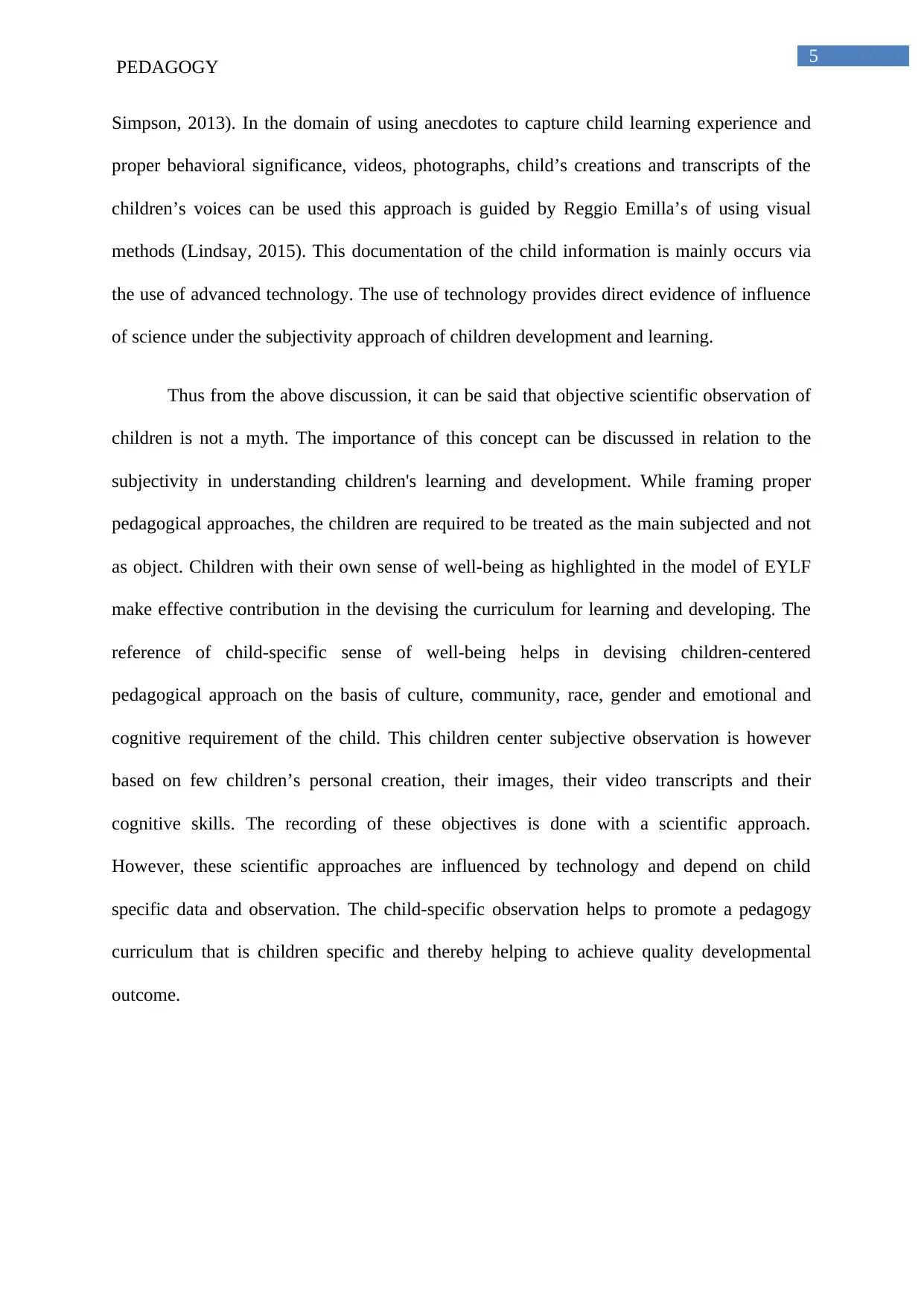
5
PEDAGOGY
Simpson, 2013). In the domain of using anecdotes to capture child learning experience and
proper behavioral significance, videos, photographs, child’s creations and transcripts of the
children’s voices can be used this approach is guided by Reggio Emilla’s of using visual
methods (Lindsay, 2015). This documentation of the child information is mainly occurs via
the use of advanced technology. The use of technology provides direct evidence of influence
of science under the subjectivity approach of children development and learning.
Thus from the above discussion, it can be said that objective scientific observation of
children is not a myth. The importance of this concept can be discussed in relation to the
subjectivity in understanding children's learning and development. While framing proper
pedagogical approaches, the children are required to be treated as the main subjected and not
as object. Children with their own sense of well-being as highlighted in the model of EYLF
make effective contribution in the devising the curriculum for learning and developing. The
reference of child-specific sense of well-being helps in devising children-centered
pedagogical approach on the basis of culture, community, race, gender and emotional and
cognitive requirement of the child. This children center subjective observation is however
based on few children’s personal creation, their images, their video transcripts and their
cognitive skills. The recording of these objectives is done with a scientific approach.
However, these scientific approaches are influenced by technology and depend on child
specific data and observation. The child-specific observation helps to promote a pedagogy
curriculum that is children specific and thereby helping to achieve quality developmental
outcome.
PEDAGOGY
Simpson, 2013). In the domain of using anecdotes to capture child learning experience and
proper behavioral significance, videos, photographs, child’s creations and transcripts of the
children’s voices can be used this approach is guided by Reggio Emilla’s of using visual
methods (Lindsay, 2015). This documentation of the child information is mainly occurs via
the use of advanced technology. The use of technology provides direct evidence of influence
of science under the subjectivity approach of children development and learning.
Thus from the above discussion, it can be said that objective scientific observation of
children is not a myth. The importance of this concept can be discussed in relation to the
subjectivity in understanding children's learning and development. While framing proper
pedagogical approaches, the children are required to be treated as the main subjected and not
as object. Children with their own sense of well-being as highlighted in the model of EYLF
make effective contribution in the devising the curriculum for learning and developing. The
reference of child-specific sense of well-being helps in devising children-centered
pedagogical approach on the basis of culture, community, race, gender and emotional and
cognitive requirement of the child. This children center subjective observation is however
based on few children’s personal creation, their images, their video transcripts and their
cognitive skills. The recording of these objectives is done with a scientific approach.
However, these scientific approaches are influenced by technology and depend on child
specific data and observation. The child-specific observation helps to promote a pedagogy
curriculum that is children specific and thereby helping to achieve quality developmental
outcome.
⊘ This is a preview!⊘
Do you want full access?
Subscribe today to unlock all pages.

Trusted by 1+ million students worldwide
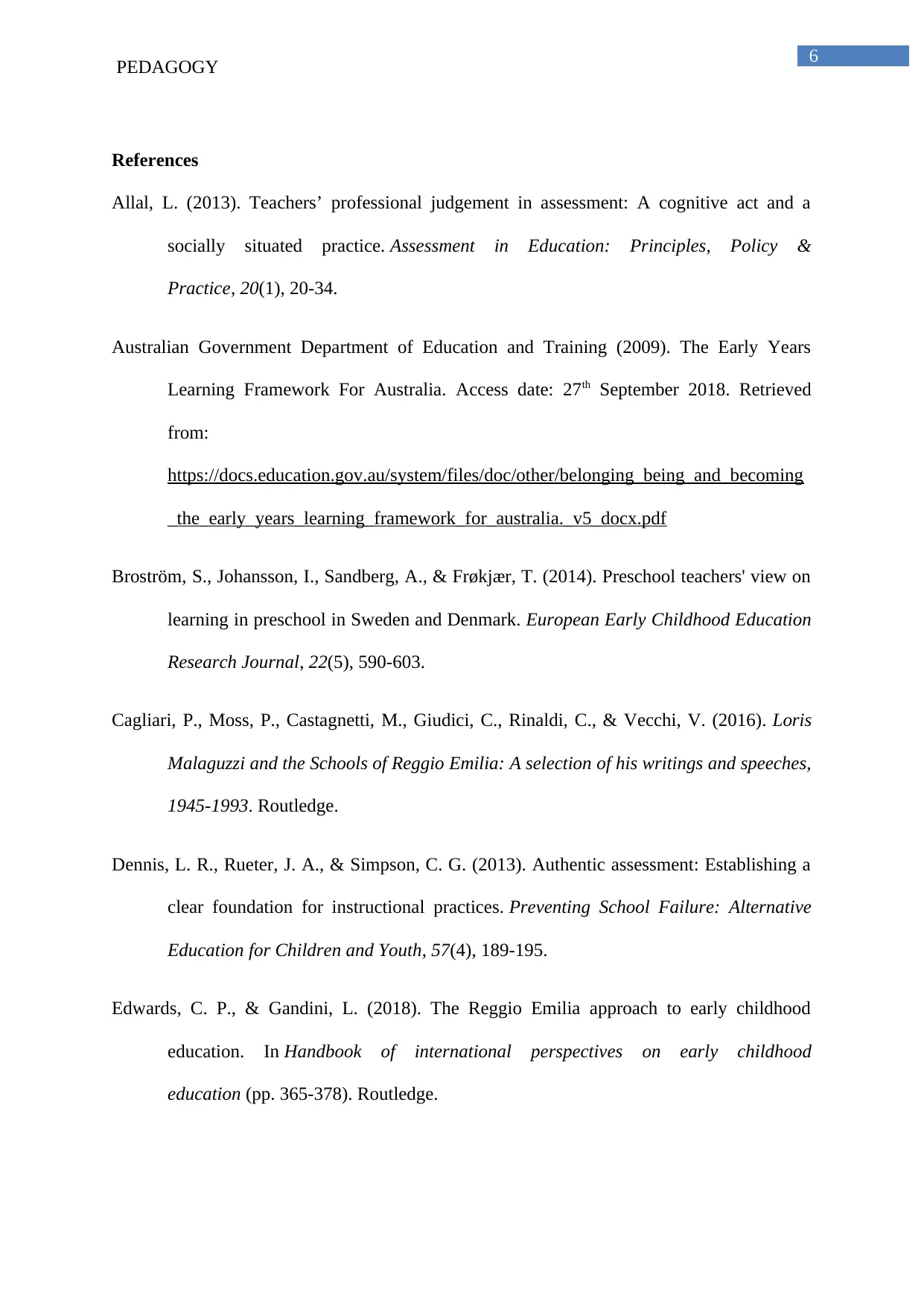
6
PEDAGOGY
References
Allal, L. (2013). Teachers’ professional judgement in assessment: A cognitive act and a
socially situated practice. Assessment in Education: Principles, Policy &
Practice, 20(1), 20-34.
Australian Government Department of Education and Training (2009). The Early Years
Learning Framework For Australia. Access date: 27th September 2018. Retrieved
from:
https://docs.education.gov.au/system/files/doc/other/belonging_being_and_becoming
_the_early_years_learning_framework_for_australia._v5_docx.pdf
Broström, S., Johansson, I., Sandberg, A., & Frøkjær, T. (2014). Preschool teachers' view on
learning in preschool in Sweden and Denmark. European Early Childhood Education
Research Journal, 22(5), 590-603.
Cagliari, P., Moss, P., Castagnetti, M., Giudici, C., Rinaldi, C., & Vecchi, V. (2016). Loris
Malaguzzi and the Schools of Reggio Emilia: A selection of his writings and speeches,
1945-1993. Routledge.
Dennis, L. R., Rueter, J. A., & Simpson, C. G. (2013). Authentic assessment: Establishing a
clear foundation for instructional practices. Preventing School Failure: Alternative
Education for Children and Youth, 57(4), 189-195.
Edwards, C. P., & Gandini, L. (2018). The Reggio Emilia approach to early childhood
education. In Handbook of international perspectives on early childhood
education (pp. 365-378). Routledge.
PEDAGOGY
References
Allal, L. (2013). Teachers’ professional judgement in assessment: A cognitive act and a
socially situated practice. Assessment in Education: Principles, Policy &
Practice, 20(1), 20-34.
Australian Government Department of Education and Training (2009). The Early Years
Learning Framework For Australia. Access date: 27th September 2018. Retrieved
from:
https://docs.education.gov.au/system/files/doc/other/belonging_being_and_becoming
_the_early_years_learning_framework_for_australia._v5_docx.pdf
Broström, S., Johansson, I., Sandberg, A., & Frøkjær, T. (2014). Preschool teachers' view on
learning in preschool in Sweden and Denmark. European Early Childhood Education
Research Journal, 22(5), 590-603.
Cagliari, P., Moss, P., Castagnetti, M., Giudici, C., Rinaldi, C., & Vecchi, V. (2016). Loris
Malaguzzi and the Schools of Reggio Emilia: A selection of his writings and speeches,
1945-1993. Routledge.
Dennis, L. R., Rueter, J. A., & Simpson, C. G. (2013). Authentic assessment: Establishing a
clear foundation for instructional practices. Preventing School Failure: Alternative
Education for Children and Youth, 57(4), 189-195.
Edwards, C. P., & Gandini, L. (2018). The Reggio Emilia approach to early childhood
education. In Handbook of international perspectives on early childhood
education (pp. 365-378). Routledge.
Paraphrase This Document
Need a fresh take? Get an instant paraphrase of this document with our AI Paraphraser
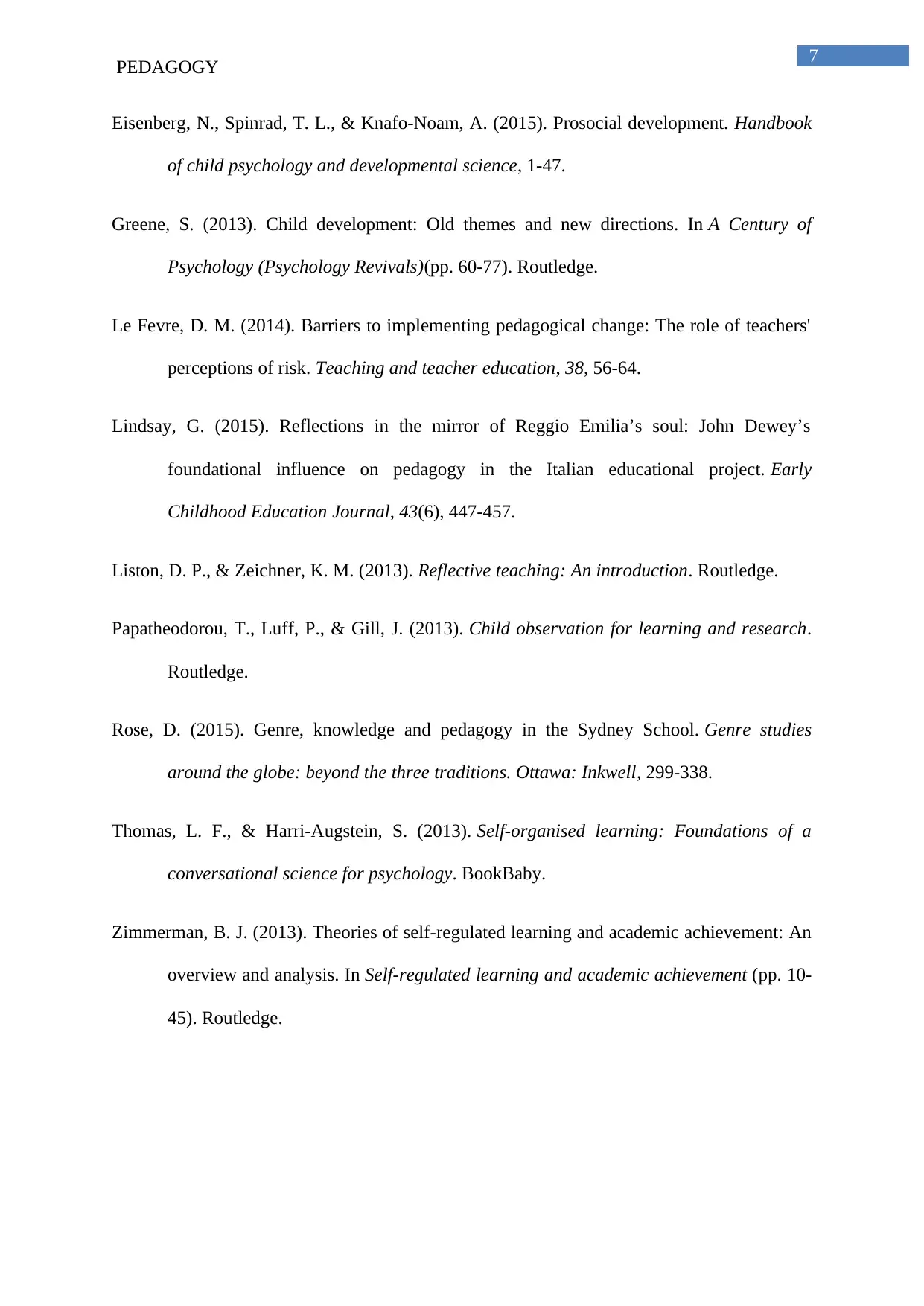
7
PEDAGOGY
Eisenberg, N., Spinrad, T. L., & Knafo‐Noam, A. (2015). Prosocial development. Handbook
of child psychology and developmental science, 1-47.
Greene, S. (2013). Child development: Old themes and new directions. In A Century of
Psychology (Psychology Revivals)(pp. 60-77). Routledge.
Le Fevre, D. M. (2014). Barriers to implementing pedagogical change: The role of teachers'
perceptions of risk. Teaching and teacher education, 38, 56-64.
Lindsay, G. (2015). Reflections in the mirror of Reggio Emilia’s soul: John Dewey’s
foundational influence on pedagogy in the Italian educational project. Early
Childhood Education Journal, 43(6), 447-457.
Liston, D. P., & Zeichner, K. M. (2013). Reflective teaching: An introduction. Routledge.
Papatheodorou, T., Luff, P., & Gill, J. (2013). Child observation for learning and research.
Routledge.
Rose, D. (2015). Genre, knowledge and pedagogy in the Sydney School. Genre studies
around the globe: beyond the three traditions. Ottawa: Inkwell, 299-338.
Thomas, L. F., & Harri-Augstein, S. (2013). Self-organised learning: Foundations of a
conversational science for psychology. BookBaby.
Zimmerman, B. J. (2013). Theories of self-regulated learning and academic achievement: An
overview and analysis. In Self-regulated learning and academic achievement (pp. 10-
45). Routledge.
PEDAGOGY
Eisenberg, N., Spinrad, T. L., & Knafo‐Noam, A. (2015). Prosocial development. Handbook
of child psychology and developmental science, 1-47.
Greene, S. (2013). Child development: Old themes and new directions. In A Century of
Psychology (Psychology Revivals)(pp. 60-77). Routledge.
Le Fevre, D. M. (2014). Barriers to implementing pedagogical change: The role of teachers'
perceptions of risk. Teaching and teacher education, 38, 56-64.
Lindsay, G. (2015). Reflections in the mirror of Reggio Emilia’s soul: John Dewey’s
foundational influence on pedagogy in the Italian educational project. Early
Childhood Education Journal, 43(6), 447-457.
Liston, D. P., & Zeichner, K. M. (2013). Reflective teaching: An introduction. Routledge.
Papatheodorou, T., Luff, P., & Gill, J. (2013). Child observation for learning and research.
Routledge.
Rose, D. (2015). Genre, knowledge and pedagogy in the Sydney School. Genre studies
around the globe: beyond the three traditions. Ottawa: Inkwell, 299-338.
Thomas, L. F., & Harri-Augstein, S. (2013). Self-organised learning: Foundations of a
conversational science for psychology. BookBaby.
Zimmerman, B. J. (2013). Theories of self-regulated learning and academic achievement: An
overview and analysis. In Self-regulated learning and academic achievement (pp. 10-
45). Routledge.
1 out of 8
Related Documents
Your All-in-One AI-Powered Toolkit for Academic Success.
+13062052269
info@desklib.com
Available 24*7 on WhatsApp / Email
![[object Object]](/_next/static/media/star-bottom.7253800d.svg)
Unlock your academic potential
Copyright © 2020–2026 A2Z Services. All Rights Reserved. Developed and managed by ZUCOL.





